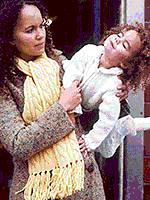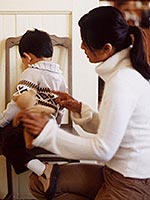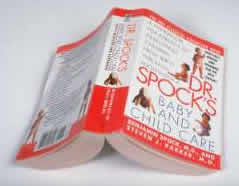Five
Proven Techniques For Dealing With Defiance


"You can't make me!" Remove her/him
 This
is the gold standard of defiance busting. When your child reaches the
limit, simply swoop in and physically leave the store, take her out
of the sandbox, end the playdate, and head home. There must be no hesitation
on your part. Don't cajole, beg, or convince. Your child's banking on
an emotional reaction from you -- if there isn't one, she gets no payoff.
Explain your action in very clear language: "You didn't stop throwing
sand when I told you to, so now I'm taking you out of the sandbox."
This is bottom-line, no-nonsense discipline, and it works best when
used with obviously egregious behaviors.
This
is the gold standard of defiance busting. When your child reaches the
limit, simply swoop in and physically leave the store, take her out
of the sandbox, end the playdate, and head home. There must be no hesitation
on your part. Don't cajole, beg, or convince. Your child's banking on
an emotional reaction from you -- if there isn't one, she gets no payoff.
Explain your action in very clear language: "You didn't stop throwing
sand when I told you to, so now I'm taking you out of the sandbox."
This is bottom-line, no-nonsense discipline, and it works best when
used with obviously egregious behaviors.
Create
consequences
 When
the misbehavior isn't site-specific, or you can't just leave, or you're
at home, you've got to find a threat that matters to your child. After
all, one child's time-out is another child's excuse to daydream. Consequences
tied to the misbehavior are best: "The longer you delay going to
bed, the fewer stories I'll have time to read you." The lesson
that Mom doesn't forget bad behavior can also pack a wallop. Try this:
When your child acts out at a party, tell her she'll have to miss the
next one -- and photograph her misbehaving. When the next invite comes,
bring out the picture to remind her of why she won't be going.
When
the misbehavior isn't site-specific, or you can't just leave, or you're
at home, you've got to find a threat that matters to your child. After
all, one child's time-out is another child's excuse to daydream. Consequences
tied to the misbehavior are best: "The longer you delay going to
bed, the fewer stories I'll have time to read you." The lesson
that Mom doesn't forget bad behavior can also pack a wallop. Try this:
When your child acts out at a party, tell her she'll have to miss the
next one -- and photograph her misbehaving. When the next invite comes,
bring out the picture to remind her of why she won't be going.

Empathy
 Currently
in vogue is the notion of letting the child know that you understand
how she feels. "I know how frustrated you are. I wish we could
stay at the park all day, too, but..." This is a good choice when
you suspect something besides outright defiance is causing the problem.
Next time your child has a meltdown at the five-and-dime, ask yourself:
Has she missed a nap? Has she eaten lunch? Is there a new baby brother
at home getting all the attention? Sometimes all that's needed is a
little extra loving from Mom.
Currently
in vogue is the notion of letting the child know that you understand
how she feels. "I know how frustrated you are. I wish we could
stay at the park all day, too, but..." This is a good choice when
you suspect something besides outright defiance is causing the problem.
Next time your child has a meltdown at the five-and-dime, ask yourself:
Has she missed a nap? Has she eaten lunch? Is there a new baby brother
at home getting all the attention? Sometimes all that's needed is a
little extra loving from Mom.

Count down
 "I
want you in here by the time I count to five!" This tells your
child that you're done asking and his time is nigh. It's an effective
method if you're prepared to follow through (and have done so in the
past). It's when you reach the magic number and then continue to plead
that you've lost the battle. You've got to show your kids you mean business,
every time -- whether it's picking them up and carrying them to the
car or putting them into bed fully clothed. Some parents swear by counting
backward: Zero is more final than five, which is so tempting to stretch
into siiiiixxxxxx or even sevvvvvennn.
"I
want you in here by the time I count to five!" This tells your
child that you're done asking and his time is nigh. It's an effective
method if you're prepared to follow through (and have done so in the
past). It's when you reach the magic number and then continue to plead
that you've lost the battle. You've got to show your kids you mean business,
every time -- whether it's picking them up and carrying them to the
car or putting them into bed fully clothed. Some parents swear by counting
backward: Zero is more final than five, which is so tempting to stretch
into siiiiixxxxxx or even sevvvvvennn.

Do nothing
 Unfortunately,
hunger and exhaustion (or worse, both) can render your child immune
to any discipline technique. What do you do then? Sometimes, not a thing.
One mom was stuck in traffic when her 3-year-old demanded a lollipop
to top off his snow cone. He hadn't slept well the night before, and
it was a sweltering 100-degree day. Mom said no, and it sent him over
the edge. She realized the best she could do was stay calm and get home
safely. Once there, she plopped her thrashing, shrieking child in the
time-out chair. Within minutes, her little monster had fallen sound
asleep where he sat. Sometimes, it seems, kids deal with their defiance
all by themselves.
Unfortunately,
hunger and exhaustion (or worse, both) can render your child immune
to any discipline technique. What do you do then? Sometimes, not a thing.
One mom was stuck in traffic when her 3-year-old demanded a lollipop
to top off his snow cone. He hadn't slept well the night before, and
it was a sweltering 100-degree day. Mom said no, and it sent him over
the edge. She realized the best she could do was stay calm and get home
safely. Once there, she plopped her thrashing, shrieking child in the
time-out chair. Within minutes, her little monster had fallen sound
asleep where he sat. Sometimes, it seems, kids deal with their defiance
all by themselves.
12
DO'S AND DON'T'S TO SAY TO YOUR CHILD

The
5 things that are good to say
 "Please"
and "Thank you." Politeness starts at the top. Not
only will you model good manners for your child, but when you're mad,
saying "please" can help you feel more in control of your
emotions.
"Please"
and "Thank you." Politeness starts at the top. Not
only will you model good manners for your child, but when you're mad,
saying "please" can help you feel more in control of your
emotions.
 "The
rule is..." A good way to avoid many conflicts -- or at
least nip them in the bud: Make your expectations clear. Kids need to
know what the rules are. And remind them as often as necessary.
"The
rule is..." A good way to avoid many conflicts -- or at
least nip them in the bud: Make your expectations clear. Kids need to
know what the rules are. And remind them as often as necessary.
 "I
forgive you." When your child trips up and then makes
amends, let him know right away that it's over and forgotten.
"I
forgive you." When your child trips up and then makes
amends, let him know right away that it's over and forgotten.
 "I'm
sorry." While you shouldn't apologize for being the person
in charge and therefore being the one making the rules ("I'm sorry
-- it's your bedtime"), empathy has its place. Use it when you
make a mistake: "I was late getting to the ball game, and I missed
seeing you score. That's disappointing. I'm sorry."
"I'm
sorry." While you shouldn't apologize for being the person
in charge and therefore being the one making the rules ("I'm sorry
-- it's your bedtime"), empathy has its place. Use it when you
make a mistake: "I was late getting to the ball game, and I missed
seeing you score. That's disappointing. I'm sorry."
 "I
love you." Express this not just in words but through
your actions too. Giving a high five or thumbs-up or tousling your child's
hair can let him know that you love and value him -- no matter what
happened an hour before. --
"I
love you." Express this not just in words but through
your actions too. Giving a high five or thumbs-up or tousling your child's
hair can let him know that you love and value him -- no matter what
happened an hour before. --





The
7 things you should not say
 "Hurry
up!"
"Hurry
up!"
There's a tendency to make kids feel guilty for causing us to rush.
The guilt may make him feel bad, but it won't get him moving faster.
 "Great
job!"
"Great
job!"
What could be wrong with praise? Tossing out a compliment for every
task becomes meaningless. Save it for accomplishments that require
real effort.
 Praise
only those accomplishments that require real effort. Finishing a glass
of milk doesn't cut it. Neither does drawing a picture, if your child
is the kind who makes dozens of them every day.
Praise
only those accomplishments that require real effort. Finishing a glass
of milk doesn't cut it. Neither does drawing a picture, if your child
is the kind who makes dozens of them every day.
 Be
specific. Instead of "Beautiful job," say, "What bright,
happy colors you picked for the dog's spots." Or "I see
you drew a picture of the story that we read this morning."
Be
specific. Instead of "Beautiful job," say, "What bright,
happy colors you picked for the dog's spots." Or "I see
you drew a picture of the story that we read this morning."
 Praise
the behavior rather than the child: "You were so quiet with your
puzzle while I was finishing that paperwork, just like I asked."
Praise
the behavior rather than the child: "You were so quiet with your
puzzle while I was finishing that paperwork, just like I asked."
 "I'll
give you something to cry about!"
"I'll
give you something to cry about!"
Threats rarely get results. It's more effective to use constructive
tactics, such as redirection or time-outs.
 "Leave
me alone!"
"Leave
me alone!"
When you routinely say that you're too busy, kids internalize the
message. Give them some parameters: "When I'm done, then we'll
play."
 "Don't
cry!"
"Don't
cry!"
Rather than deny your child's feelings, talk about her emotions. Give
your child the words to express herself, and ultimately she'll cry
less.
 "Wait
till Daddy gets home!"
"Wait
till Daddy gets home!"
Passing the buck undermines your authority. And by the time he does
get home, it's likely that your child will forget what he did wrong.
 "You're
so..."
"You're
so..."
Even labels that seem positive, like "smart," shortchange
kids' developing personalities. Talk about their specific behaviors,
not traits. --
Ten
things to do for your children:
Love them, build their self-esteem, challenge them, listen to them,
expect respect, limit them, make God a part of their lives,develop
their love of learning, help them to be community-minded, let them
go. -- Yogi Bhajan
Children are born with intrinsic leadership traits that prepare them for life. These must translate positively into the lives they lead as citizens of the world. These are: Service, Justice, Courage, Compassion, Decisiveness, Reliability, Integrity, Initiative, Knowledge, Loyalty, Enthusiasm, Endurance. -- First Teachers Are Women
Children

Children
Learn What They Live 







Parental
Pointers For The Year 2011
Reasons
Not To Mess With A Child
Is
Your Kid Spoiled Rotten
For
Kids With A Lazy Eye
Meditation
For Parents
The
Way Kids See It
Boys
Will Be Boys
A
Race of Women
The
Indigo Child
Yoga
For Kids
You
are IT
